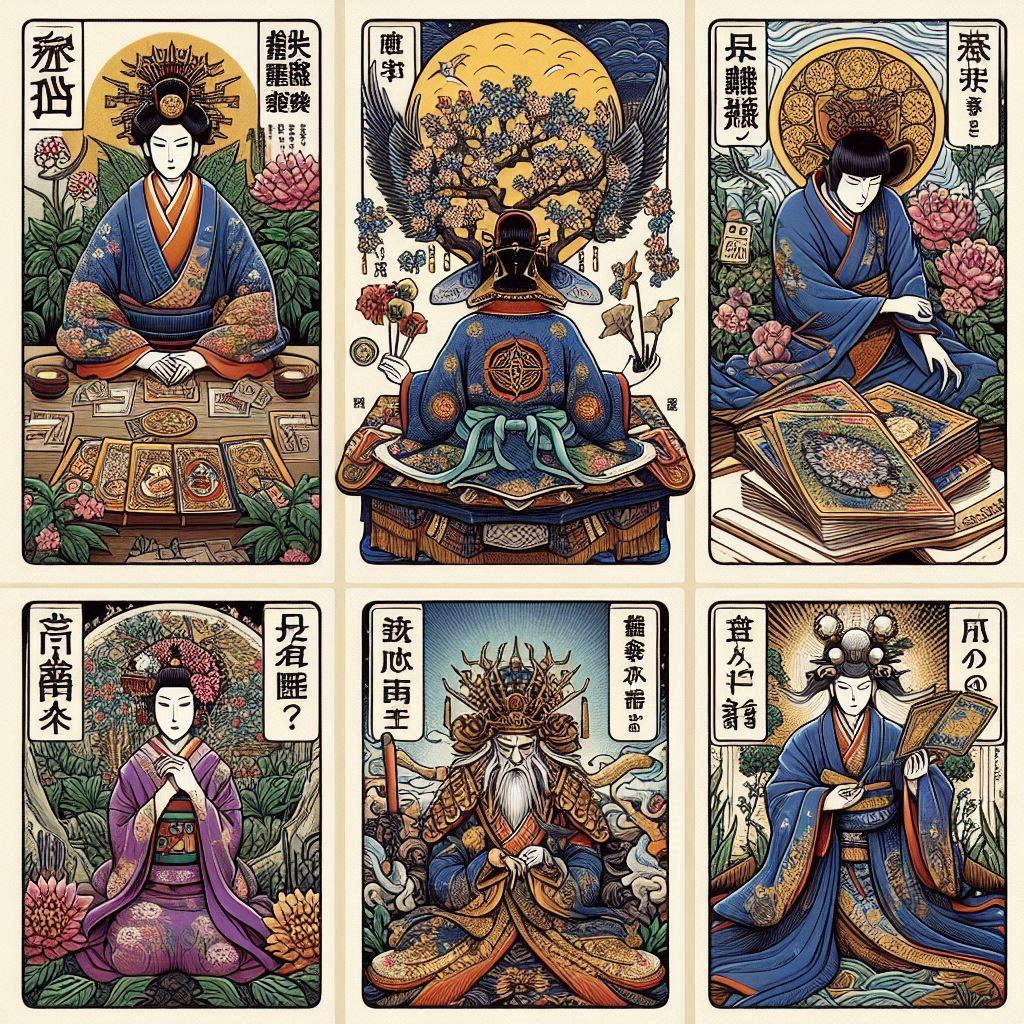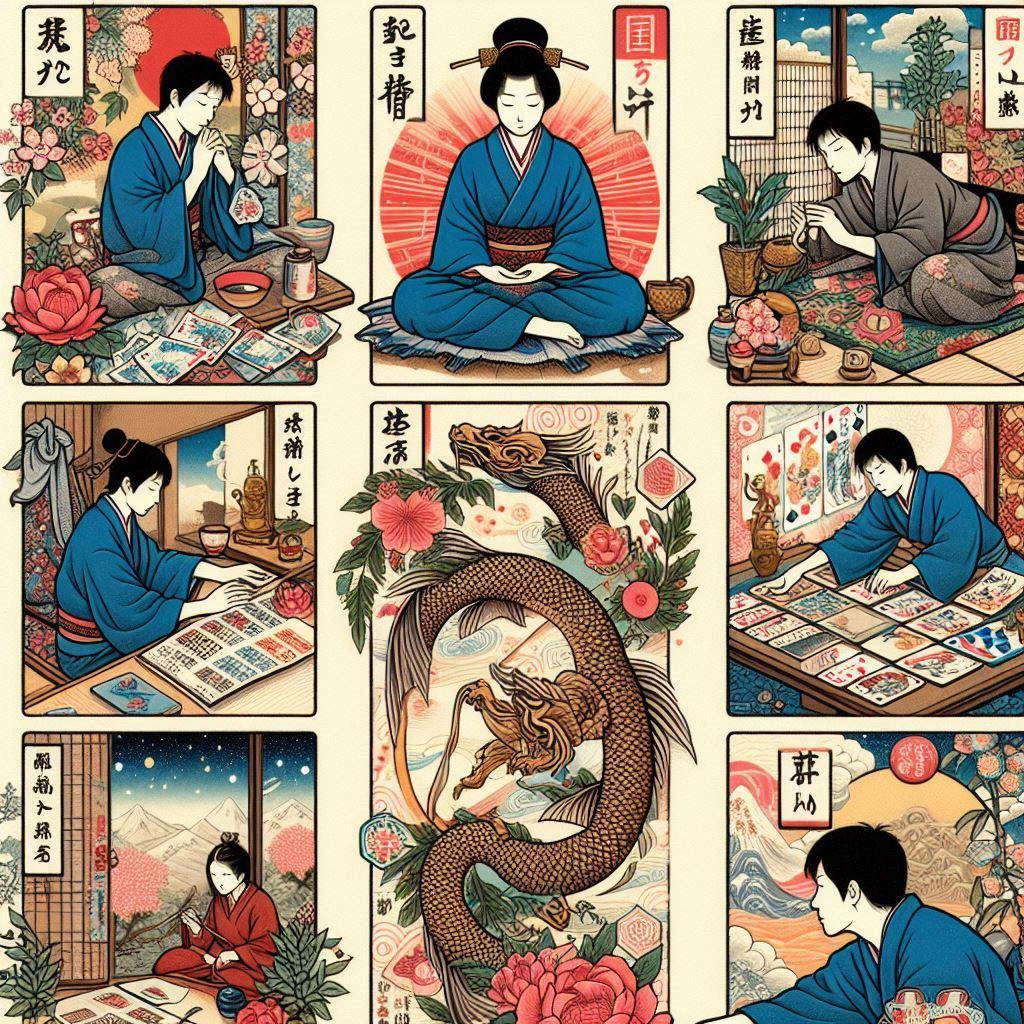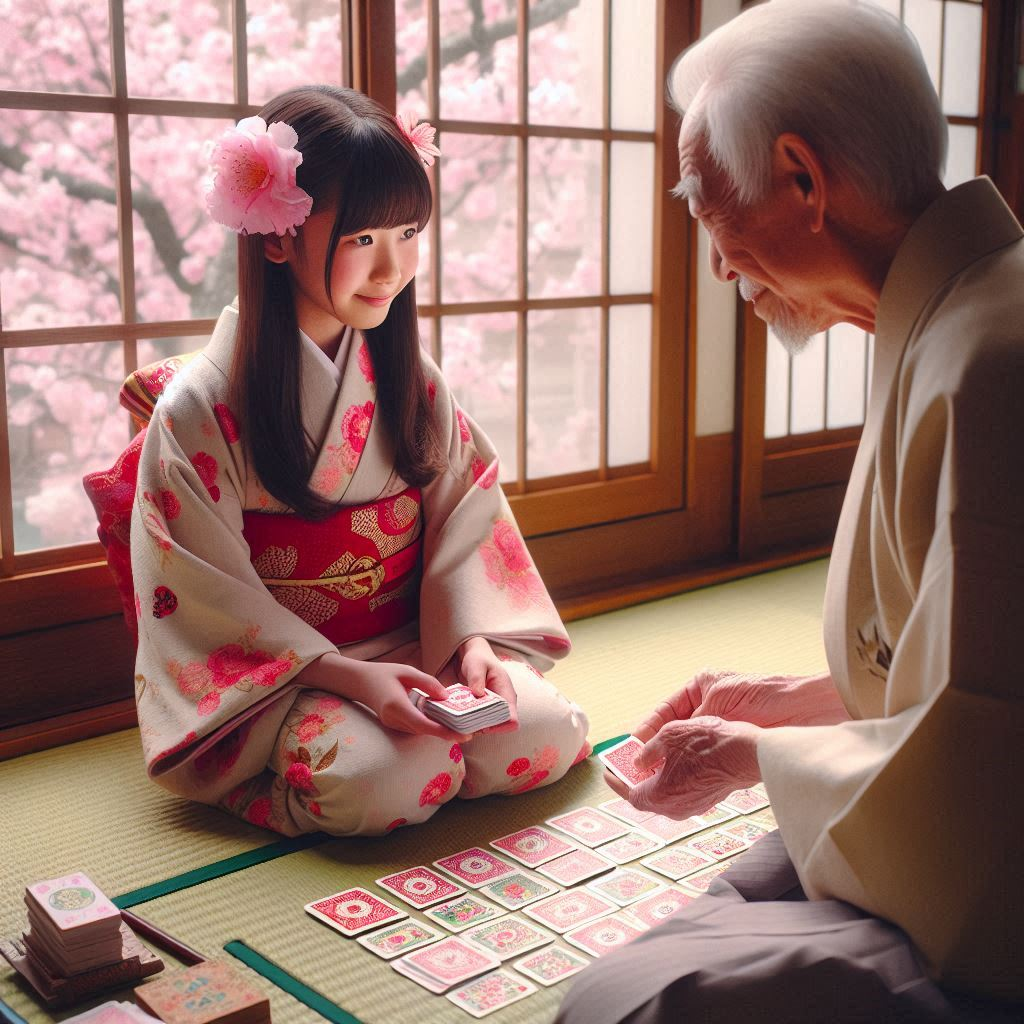5. Nemawashi (根回し)
Nemawashi is a Japanese practice of reaching a consensus within a group before making important decisions. During the Nemawashi process, each participant plays a role, and all opinions are considered to achieve agreement. This reflects a key aspect of Japanese culture, which emphasizes collectivism and respect for others’ opinions. Similarly, each card in Hanafuda has its place in the hierarchy and symbolizes certain natural cycles, collective interaction, and harmony.

Meditative Divination:
Choosing Cards:
Select 1 to 9 cards, focusing on their symbolism and how they interact with one another. The cards may represent different roles you or others play within a group, as well as suggest ways to achieve consensus and harmony within the collective.
Questions for Meditation in the Context of Nemawashi:
- How can the selected cards help me establish communication and reach agreement with others?
Pay attention to the symbols on the cards and think about how they might represent different aspects of communication and collective interaction. What elements of the cards suggest how to better convey your thoughts and listen to others? - What roles and interactions depicted on the cards can I apply in my team?
Analyze which cards might symbolize various roles within your group or team. How can these roles contribute to achieving a common goal? What do the cards reveal about the importance of understanding and respecting others’ roles? - What lessons can I draw from the cards to improve my negotiation skills?
Examine the cards for strategies or approaches to negotiations they might symbolize. Consider how you can use these symbols to enhance your negotiation skills and achieve mutually beneficial solutions.
Practical Application of Nemawashi:
- Preparation for Discussion:
Before discussing an important decision, spend time preparing and examining all aspects of the issue. Analyze your Hanafuda cards and think about how they can help you better understand the situation and each participant’s role. - Discussion with Participants:
Hold individual meetings with members of your team or group. Learn their opinions, concerns, and ideas. How do the cards highlight the importance of listening to others? Try to incorporate these insights into your communication. - Seeking Consensus:
Use the information gathered in the previous step to reach a collective decision. Consider how the symbols on your Hanafuda cards might guide you toward finding compromise and harmony within the group. For example, if the cards feature symbols indicating balance or cooperation, use these images as guidance. - Decision-Making:
After reaching a consensus, present the decision to the group and formalize it. Focus on the importance of maintaining harmony and respecting everyone’s opinions.
Integrating Cards into the Nemawashi Process:
Hanafuda cards can serve as visual reminders of the need to consider the opinions and feelings of others. They can help you recognize interactions and roles within the group that may not be immediately apparent. Meditate on the cards before important meetings or discussions to set the right tone and find a path to consensus, drawing on the collectivism and harmony reflected in Japanese culture and the Nemawashi philosophy.
6. Shinrin-yoku (森林浴)
Shinrin-yoku, or “forest bathing,” is a Japanese practice of immersing oneself in nature to restore inner balance and spiritual strength. This technique is rooted in the concept of Wabi-Sabi, which teaches finding beauty in simplicity and the natural world around us. Hanafuda cards, depicting elements of nature—trees, flowers, animals—serve as a reminder of our inseparable connection with nature.
Meditative Divination:
Choosing Cards:
Select 1 to 9 Hanafuda cards, focusing on the natural elements depicted on them. Reflect on how these images might embody different aspects of nature that you can connect with in your life.
Questions for Meditation in the Context of Shinrin-yoku:
- How can the nature depicted on the cards help me restore inner balance and strength?
Consider each selected card and think about the natural elements shown on it. It might be a flower, tree, bird, or water. Allow these images to evoke a sense of peace and balance within you. How might these elements of nature symbolize the restoration of your energy and inner tranquility? - What elements of natural harmony reflected on the cards can I incorporate into my life?
Analyze the natural elements depicted on the cards and consider how they can be applied to your daily life. Which symbols on the cards remind you of the need for simplicity, harmony, and naturalness in your life? - How do the cards inspire me to form a deeper connection with nature and myself?
Let yourself be inspired by the cards and their images to find ways to establish a deeper connection with nature and yourself. What images on the cards encourage you to go outside, spend time in the fresh air, and enjoy moments of unity with nature?
Practical Application of Shinrin-yoku:
- Immersion in Nature:
Choose a place for a walk in the fresh air—this could be a park, forest, garden, or even your own balcony. Spend time there, focusing on each step, breath, and the nature surrounding you. Imagine the Hanafuda card images coming to life in the nature around you. Let the walk become your personal time for restoring inner balance. - Meditation in Nature:
While in nature, find a peaceful spot where you can sit or lie down. Close your eyes and imagine yourself surrounded by the nature depicted on the cards. Feel nature enveloping you and filling you with energy. Let your mind focus on every sound, scent, and sensation of nature around you. - Contemplation of Natural Elements:
If you are at home, take time to contemplate the natural elements around you—houseplants, stones, flowers, or even just the light streaming through the window. Meditate on these natural elements as you would on the images from the Hanafuda cards, and let them inspire you to find inner harmony and connection with nature.
The Shinrin-yoku technique helps you immerse yourself in nature and restore balance in life. Using Hanafuda cards as a meditative tool before going into nature can enhance your perception of natural harmony and deepen your connection with the world around you. These cards remind us of the simplicity, naturalness, and beauty of nature, inspiring us to engage more deeply with both it and ourselves.


